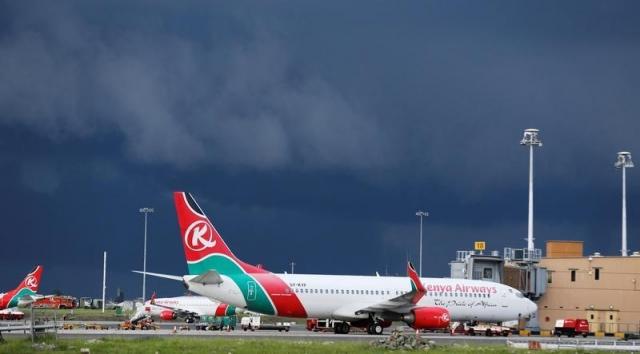Breaking News
Emirates And Kenya Airways Suspend Abuja Operations

Dubai-based Emirates Airlines and Kenya Airways have announced the suspension of their flights to the Nnamdi Azikiwe International Airport, Abuja, Nigeria’s capital, in the face of the economic downturn in the country, foreign exchange scarcity, and the shrinking passenger traffic on international routes.
Emirates, one of the biggest foreign airlines operating in Nigeria, said it would stop flights effective October 22, while the East African carrier, Kenya Airways, has also announced that it would suspend flights to and from Abuja with effect from November 15, 2016 as part of its restructuring and loss-saving measures.
In this regard, Emirates was said to have written to the Minister of State, Aviation, Senator Hadi Sirika, over its intention to stop flights from Abuja, indicating its inability to buy FX.
The letter was said to have been received by the Permanent Secretary, Ministry of Transportation.
The airline was reported to have said, if after weeks off the Abuja suspension, no drastic change happens, Emirates would also suspend Lagos operations indefinitely and with that exit the Nigerian market.
Emirates like many major international carriers operating in Nigeria, has huge sums for ticket sales with the banks, which it has not been able to repatriate.
About two months ago, foreign airlines’ funds trapped in the Central Bank of Nigeria (CBN) was put at $900 million but the federal government granted the airlines access to FX at a concessionary exchange rate to enable them repatriate about 50 per cent of their ticket sales.
Besides the huge funds trapped in Nigeria, the recession has led to a reduction in passenger traffic, forcing the foreign airlines to reassess the logistics of operating from Nigeria with low load factors.
Emirates Airline has also threatened to stop its flights into Africa if the economic downturn on the continent worsens.
The president of the airline, Tim Clark, stated this in Dubai yesterday at an International Air Transport Association (IATA) forum.
Clark said foreign airlines flying to Africa now refuel abroad because jet fuel supplies had become more expensive and scarce in some African countries.
“In certain African countries, the currencies have really gone down, so we’re reflecting on a number of these to look at where it’s just not worth for us to travel,” Clark said.
He added that Emirates’ load factor – a measure of capacity utitlisation – for the rest of 2016 and 2017, would probably be in the mid-70s to low-80s in percentage terms.
Clark, however, said there would be some peaks and troughs in that time.
About a month ago, Emirates started tanking fuel from Accra, Ghana because of the scarcity of jet fuel in Nigeria.
Other foreign carriers were also forced to refuel at different locations outside the country before flying to Nigeria.
THISDAY contacted the airlines’ media office in Lagos and it confirmed the suspension of Abuja flights, stating: “Emirates can confirm that it’s suspending its four times weekly service between Abuja, Nigeria and Dubai with effect from 22nd October 2016.
“The decision was made after a review of the airline’s operations to ensure the best utilisation of its aircraft fleet for its overall business objectives. The airline continues to serve Nigeria with a daily flight to and from Lagos.”
In a related development, the federal government after the recent shake up at the Federal Airports Authority of Nigeria (FAAN), yesterday announced the appointment of two new directors to help the organisation realise its new set goals.
The new directors are Mrs. Nike Aboderin, who was made Director, Finance and Accounts (DFA), and Mr. Sadiku Abdulkadir Rafindadi, appointed as Director, Commercial and Business Development (DCBD).
The agency said Mrs. Aboderin is a Fellow of the Chartered Institute of Bankers of Nigeria (FCIB). She holds an M.Sc degree in Banking and Finance from the University of Lagos.
“Mrs. Aboderin possesses over 23 years experience in the financial services industry, which has exposed her to both public and private exploits at different institutions including multinationals.
“She is also an Advanced Management Programme (AMP) graduate of the Lagos Business School.
“In addition, she holds a post graduate certificate in Global Strategic Management (GSM) from the Harvard Business School, Boston, USA. She is married with children,” FAAN said in a statement signed by its acting General Manager, Public Affairs, Mrs. Henrietta Yakubu.
The agency added that Rafindadi is a 1985 graduate of Economics of the University of Pittsburgh. He also holds an MBA in Finance from the Clark Atlanta University, USA.
“He attended Kaduna Polytechnic, where he obtained a certificate in Management Studies. Mr. Rafindadi is a seasoned amiable manager who started his career as a young officer and rose to the pinnacle through diligence and commitment.
“Until his current appointment, Rafindadi worked in several management capacities in different institutions, including Phoenix Investment Services and British Petroleum. He is married with children,” FAAN said.






